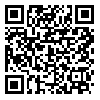شنبه 18 مرداد 1404
[Archive]
دوره 21، شماره 88 - ( 5-1392 )
جلد 21 شماره 88 صفحات 107-95 |
برگشت به فهرست نسخه ها
Download citation:
BibTeX | RIS | EndNote | Medlars | ProCite | Reference Manager | RefWorks
Send citation to:



BibTeX | RIS | EndNote | Medlars | ProCite | Reference Manager | RefWorks
Send citation to:
Rjabi Gilan N, Ghaeemi S R, Reshadat S, Rajabi gilan S. The Relationship between Social Capital and Health-Related Quality of Life among Teachers. J Adv Med Biomed Res 2013; 21 (88) :95-107
URL: http://journal.zums.ac.ir/article-1-2362-fa.html
URL: http://journal.zums.ac.ir/article-1-2362-fa.html
رجبی گیلان نادر، قاسمی سید رامین، رشادت سهیلا، رجبی گیلان سجاد. بررسی رابطهی بین سرمایهی اجتماعی و کیفیت زندگی مرتبط با سلامت در معلمان. Journal of Advances in Medical and Biomedical Research. 1392; 21 (88) :95-107
1- ، qasemi_sr@yahoo.com
چکیده: (160076 مشاهده)
Backgrounds and Objectives: Different studies have shown a relationship between social capital and health. The aim of this paper was to survey about the relation between social capital and health-related quality of life (QOL) among teachers. Materials and Methods: In this cross -sectional study, our target community was 375 people that were selected by Multi-stage cluster sampling method. For assessment of Social Capital Onyx and Bullen (2000) were used, and for assessing health-related QOL SF-36 questionnaires were used respectively. Data were analyzed with independent T, ANOVA, Pearson correlation and Regression tests. Results: The mean age of respondents was 40.7±5.26 and based on gender 51.9% of them were male. Mean and SD of total QOL and total social capital scores were 64.52±17.02 and 71.21±16.74 respectively. Pearson correlation test showed that there was a significant correlation between total social capital with total health-related QOL(r =0/153 p<0.004), cognitive social capital with physical health(r = 0/136 p<0.011) and also communicative social capital with mental health(r = 0/133 p<0.012). There was significant relationship between structural social capital and both dimensions of health-related QOL: physical health(r = 0/146, p=0.006) and mental health(r = 0/156, p=0.003). Also regression analysis showed that variables of "gender", "marital status" and "age" have not impact on the relationship between social capital and QOL and have been removed from model, but "income" was an effective variable in the main relationship of the research. Conclusion: Our finding showed that there was positive correlation between social capital and health-related QOL among teachers. It appears that focus voluntary groups activities could increases trust and personal network, and its issue could improve mental and physical health of teachers.
نوع مطالعه: کارآزمایی بالینی |
دریافت: 1392/7/25 | پذیرش: 1392/7/30 | انتشار: 1392/7/30
دریافت: 1392/7/25 | پذیرش: 1392/7/30 | انتشار: 1392/7/30
ارسال پیام به نویسنده مسئول
| بازنشر اطلاعات | |
 |
این مقاله تحت شرایط Creative Commons Attribution-NonCommercial 4.0 International License قابل بازنشر است. |




